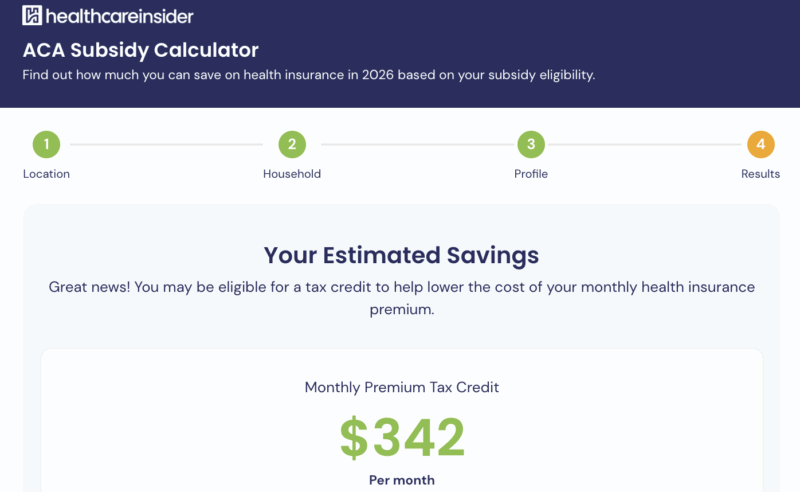
Written by Erica Block
Reviewed by Garrett Ball
Expert Reviewer
We want to help you make educated healthcare decisions. While this post may have links to lead generation forms, this won’t influence our writing. We adhere to strict editorial standards to provide the most accurate and unbiased information.
As the name implies, if you’re covered by a high-deductible health plan you pay a smaller premium amount each month, but you must also pay thousands of dollars out-of-pocket before insurance begins to cover the cost of your medical expenses. High-deductible health plans cost less than traditional insurance coverage on a monthly basis, but HDHP coverage can have high out-of-pocket costs if you have a minor injury and don’t meet your deductible.
Key Features:
- Affordable monthly premiums;
- One (high) deductible;
- Annual exams + preventive care are covered; and
- Access to health savings accounts (HSAs).
How Does a Plan Qualify as an HDHP?
While high-deductible health plans can be described as a form of “catastrophic coverage,” they’re in their own health insurance category. The Internal Revenue Service (IRS) determines every year what counts as an HDHP and it changes from year to year.
For 2020, HDHPs are those with a deductible of at least $1,400 for individuals or at least $2,800 for families. Oftentimes, though, the deductibles are much higher.
The IRS does provide some financial protection to people enrolled in HDHPs in the form of out-of-pocket maximums. For 2020, HDHP out-of-pocket maximums are set at $6,900 for individuals and $13,800 for families under the same plan. These limits were slightly adjusted from 2019, as noted in the chart below.
| IRS Dollar Limits 2019 – 2020 | ||||
| Type of Limit | Coverage Tier | 2019 | 2020 | Change |
| HSA Contribution Limit | Individual | $3,500 | $3,550 | $50 |
| Family | $7,000 | $7,100 | $100 | |
| HSA Catch-Up Contributions (not subject to adjustment for inflation) | Age 55 or older | $1,000 | $1,000 | $0 |
| HDHP Minimum Deductible | Individual | $1,350 | $1,400 | $50 |
| Family | $2,700 | $2,800 | $100 | |
| HDHP Maximum Out-of-Pocket Expense Limit (deductibles, copayments, does not include premiums) | Individual | $6,750 | $6,900 | $150 |
| Family | $13,500 | $13,800 | $300 | |
| Source: IRS, Revenue Procedure 2019-25 |
What’s Covered Under a High-Deductible Health Plan?
True to their name, HDHPs carry large annual deductibles that must be met by policyholders before the insurance company covers a portion of the bill; this results in very high out-of-pocket costs at the start, before insurance covers anything. With HDHP coverage, medical care and services (including most prescription drug costs) require you to pay out-of-pocket until you’ve met your deductible. For example, if your high-deductible health plan has a deductible of $8,000 and you find yourself with a $14,000 hospital bill, you must pay the $8,000 out-of-pocket before your insurance kicks in and helps you cover the rest of your bill.
Preventive care services are a notable exception, as HDHPs – like all plans under the ACA – are required to cover the cost of in-network preventive care, such as annual checkups, well-woman exams, and mammograms. Some HDHPs may be compatible with a health savings account (HSA). HSAs allow those enrolled in high-deductible plans to use pre-tax dollars to pay for their medical and healthcare expenses.
What Is an HSA (Health Savings Account)?
If you’re enrolled in a high-deductible health plan, you may be eligible to start a health savings account (HSA). Money in an HSA belongs to the consumer; any funds left over at the end of the year carry over into the next year.
HSAs allow people who are enrolled in an HDHP to set aside pre-tax income to pay for certain medical expenses. Money in an HSA – and the interest earned on it – isn’t taxed. Money in an HSA can be used to cover most healthcare expenses, including doctor and outpatient services, hospital and inpatient treatments, and prescription drug costs.
How Do HSAs Work?
Employers offering HSAs in conjunction with high-deductible plans can contribute to the accounts on behalf of employees; those who use HSAs frequently choose to fund the accounts with regular paycheck deductions. You can also choose to manage an HSA on your own, independent from your employer. If you have an HSA and change jobs, switch insurance plans, or retire, your HSA and the money in it are still yours. This continuity is a feature unique to HSAs. Unlike flexible savings accounts (FSAs) or some health reimbursement arrangement plans, HSA money is not governed by a “use-it-or-lose-it” arrangement.
The Benefits of Using an HSA
There are many (financial) benefits to using an HSA:
- As an investment tool: you can contribute to an HSA in the same way that you can contribute to an IRA to save for retirement.
- As a nest egg: contributions to an HSA are tax-deductible and tax-free. This means that consumers who don’t need to use HSA funds for medical expenses can leverage their savings into a nest egg for later in life.
- HSA employer contributions: some employers are willing to make HSA contributions on your behalf, matching or adding to an employee’s contributions.
Are You Eligible for an HSA?
If your insurance policy is considered an HDHP under the IRS, then you may be eligible to contribute to an HSA. Not all high-deductible policies are HSA-eligible, though; some HDHP insurance carriers offer HSAs, some don’t.
To be HSA-compatible, an HDHP must include all expenses under one deductible. Some high-deductible plans, for example, aren’t eligible because they have a separate deductible for prescription drug costs. If you’re unsure whether your plan is HSA-eligible, ask your insurer or employer. With some plans, HSA eligibility is not immediately evident. It can be hard to figure out whether or not a plan is HSA-eligible, particularly if you’re purchasing insurance through the state exchanges.
To Qualify for a Health Savings Account (HSA):
- You must be enrolled in an HDHP that is HSA-compatible.
- You can’t be enrolled in Medicare.
- You cannot be claimed as a dependent on someone else’s tax return.
- Your insurance provider must offer HSAs.
What Should I Know About HSA-Compatibility and HDHP Plans?
- An HDHP does not guarantee that your employer offers an HSA, only that they can.
- Not all HDHPs are HSA-compatible. Being subject to a deductible over $1,300 does not make your plan HSA-compatible by default; HDHPs must be established as HSA-compatible by your insurance carrier.
- Money in an HSA continues to belong to you, even if you change jobs or retire.
HDHPs & Prescription Drug Coverage
A high-deductible health plan covers the cost of certain prescription drugs that are considered “preventative.” Drugs that aren’t considered preventative must be paid in full if you haven’t yet met your out-of-pocket deductibles.
- “Preventative” drugs must be included under your high-deductible health plan provider’s list of approved medications to be covered in full and are not subject to your deductible.
- If you take a drug that is not on your insurer’s list, you’ll need to pay for your prescription medications out-of-pocket until you meet your plan deductible.
- Whether or not a medication qualifies as “preventative” is determined by your insurance carrier, so a particular drug’s eligibility may vary from plan to plan.
- If you’re unsure whether a particular medication is considered “preventative” under your plan, call your insurance provider and ask. This information may also be detailed in the Summary Plan Description of your coverage.
If you have an HSA, you can use HSA funds to pay for your prescription drugs each month.
Is a High-Deductible Health Plan Right for Me?
It depends. HDHPs are best-suited for people who are relatively healthy and rarely get sick or go to the doctor. For those who manage chronic conditions or live on lower incomes, HDHPs are not a practical choice. At any income level, they incentivize policyholders to cut back on care they may need (this is the main reason why HDHPs are controversial). High-deductible health plan coverage can also be problematic if you have an emergency, or incur unanticipated medical costs. If you are covered by an HDHP and unexpectedly break your arm, are in a car accident, or need an appendectomy, your medical bills can add up quickly.
The most important thing to remember with an HDHP: every decision you make about your medical care counts. HDHPs require consumers to take ownership and initiative over their care. In other words, it’s crucial for consumers to know what is and isn’t covered by your plan. Many routine health services intended to keep you well (e.g. colonoscopies, mammograms, and vaccinations) are covered at 100 percent by HDHPs. Policyholders should understand their coverage, so they know what’s free.
HDHPs Are a Good Choice If:
- You’re a healthy adult;
- You only visit your family practitioner for covered preventive services, such as annual check-ups, screening tests, or vaccines;
- You don’t take prescription medications; and/or
- You want to reduce your monthly expenses.
HDHPs Are a Less-Than-Optimal Option If:
- You live paycheck-to-paycheck and/or struggle to manage your finances;
- You have a chronic illness (e.g. diabetes, depression, asthma, multiple sclerosis, and so on) that requires long-term management;
- You frequently get sick and/or need medical care;
- You participate in activities or play a sport where an injury is common; and/or
- You take multiple medications, or take an expensive medication that isn’t considered preventative.
Taking the Next Steps
You can evaluate your health coverage and see if it’s the best option for your needs.
Thank you for your feedback!


 by
Garrett Ball |
Updated on
February 19, 2026
by
Garrett Ball |
Updated on
February 19, 2026 





